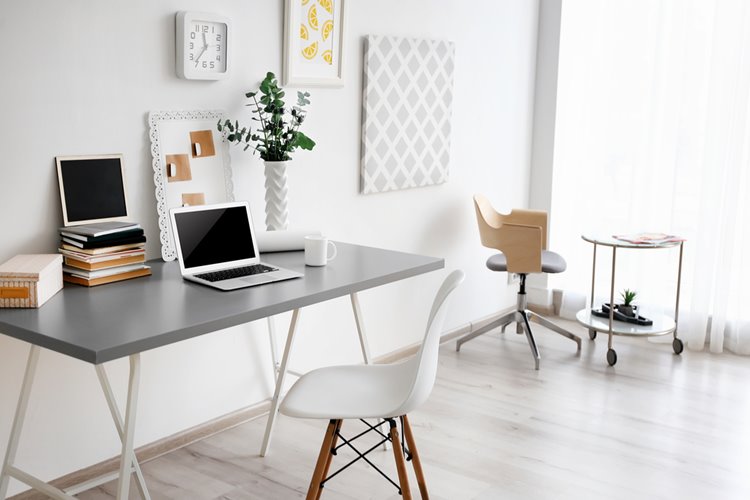5 tips for creating the ultimate study space

How is your current study space? Comfortable, tidy, quiet and distraction-free are all qualities an ideal study space should accommodate. Finding the right study space can be a challenge - whether to choose the library, your bedroom or a formal study room. Procrastination is inevitable, however there are steps that can be taken to minimise distractions and maximise productivity.
If you have trouble finding the perfect space, then create your own! With the right tools and a little help from the professionals, you can create a study oasis that will pave the path to improving your study results.
#1: Start with the basic equipment

Your choice in this first stage will provide a solid foundation in creating your ideal study space. The first step is to source the essentials; a desk and a chair. Although it sounds like a simple task, there are an abundance of factors to take into consideration when choosing the perfect study desk and chair.
The desk’s height should sit fairly evenly between your waist and ribcage to allow your elbows to rest upon it without hunching forward and affecting your posture. Poor posture can take a number of tolls on your body and quality of study, with the ability to cause headaches and affect the quality of your sleep - which is crucial to being productive.
The chair should be comfortable - but not too comfortable: comfortable enough to study adequately but not too comfortable that you doze off to sleep. It may also be helpful to avoid the snazzy chairs that recline, roll, lift and rotate as this poses as a potential distraction.
#2: Consider the lighting
If you think about your past experiences, you can probably vaguely gauge the effects of different types of lighting when it comes to your mood and levels of sleepiness. During the day, natural light is pleasant and it poses less strain on the eyes. During the evening, you tend to get more tired as well as less alert and focused.
However, what do the facts say? In a recent study, scientist Mirjam Muench decided to investigate the effects of natural vs. artificial lighting on productivity. The study found that compared to the afternoon, the group who worked in daylight were significantly more alert at the beginning of the evening, and subjects exposed to artificial light were significantly sleepier at the end of the evening. The study also found that our cortisol levels drop significantly under an artificial or poorly-lit environment - which means higher stress levels and making it tougher to stabilise your energy.
Even though natural light trumps artificial light for productivity, artificial light will still be necessary if you’re studying after sundown. In that case, it’s said that shielded full-spectrum fluorescent lights help you feel more calm, steady and less easily distracted. Installing these types of lights can be done quickly and safely with the help of a professional.
#3: Hot or cold?

Much like how lighting can have a profound impact on your productivity, the temperature in the room is something you should consider when creating your ultimate study space. Should you go for a warm or cool environment? The short answer is warm. A cold working environment can be detrimental to your productivity and accuracy. A study by Cornell tested different temperatures within an office and found:
“When temperatures were low (20 degrees Celsius) employees made 44% more mistakes than at optimal room temperature (25 degrees Celsius).” When you’re feeling cold, there’s no doubt you feel uncomfortable - but another factor affecting your productivity is your body’s attempt and energy exerted to keep your body warm - that’s less energy exerted into concentration and focus! So if you’re looking for the optimal temperature to set your heating system to; it’s 25 degrees Celsius.
#4: Who knew colours made you smarter?
Colours may not immediately make you smarter, but the right colour definitely can aid in productivity. The colour blue is said to reduce blood pressure, slowing respiration and a declining heart rate. However, saying ‘the colour blue makes you more productive’ is an oversimplification. The short answer is blue, but here is a more detailed and science-backed explanation:
Angela Wright is a colour psychologist who has written books and even developed theories on colour. Interestingly, Wright mentions that it’s not as simple as one certain colour affects one’s behaviour. Her research has shown that it’s the intensity of a colour that affects how you respond, “A bright colour will stimulate, and a colour with low saturation will soothe”.
For your study space, blue is the most appropriate shade to go with as it stimulates the mind. However, Angela recommends spicing the room up with a splash of orange so that some emotion is introduced into the study space. Finding the perfect hue of blue and having the paint flow seamlessly is the next challenge - an expert painter can help you in every step of that process.
#5: Still make it feel like home

While it’s essential to rid your study space of electronic and potentially distracting devices and objects, it’s still nice to add that personal touch to make it feel like your own. Although photos and posters can be distracting, it has the potential to motivate you as well. Does a photo of your family help you motivate to study better? What about a photo of your holiday destination you’re travelling to after you ace your exams? Whatever your motivation is, be sure to remind yourself of it in your study sanctuary.
Create a study space and succeed
Creating your study space doesn’t have to involve extensive planning and organising, but include just enough so that you create an effective place to get work done. Many features of a room affects your behaviour; lighting, temperature and the colour you choose to surround yourself with. If you're ready to hit the books (or your online study modules!) then check out Upskilled's range of 100 online courses.


)
)

